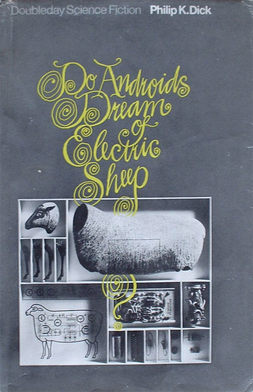As is often the case with film adaptations of older novels, sometimes the originals get lost to the public consciousness: like tears in the rain.
One such example is Philip K. Dick’s Do Androids Dream of Electric Sheep? first published in 1968, although you will no doubt be more familiar with its adaptation Blade Runner (1982). As an example of the rarified Neo-Noir genre of film and of Ridley Scott’s brilliant cinematography, Blade Runner is no-doubt a well-remembered film, even if portions of the story or the general direction didn’t age well. As a rendition of its source material, however, Blade Runner is better described as being “inspired by” Dick’s work rather than “based on.”
The general premise is the same and the story beats are…mostly the same, or similar, but when you crack open Dick’s 1968 novel, don’t expect to meet Harrison Ford’s Rick Deckard. On a fundamental level, Do Androids Dream of Electric Sheep? is a different kind of story than Blade Runner with a much different message.
This review will avoid any spoilers (because it’s doubtful anyone reading this has ever read the novel), and will be broken into two parts. The first addresses how reading the novel will help draw out interesting details about the film, whereas the second part will be aimed primarily at those who haven’t seen (or don’t care to see) Blade Runner.
So for lovers of the film, what are some key elements that differ between it and the novel it’s adapting? Well, for one, the question of empathy. Empathy is a central theme in both the film and the novel, but in the novel it takes on a much darker, more cynical character.
A common point of confusion, the terms “replicant” and “blade runner” don’t appear in the novel. Those were later additions in the process of making the film. In the book, Deckard is simply a “bounty hunter” and the replicants are instead referred to as “andys” (short for android, naturally).
Book-Deckard’s interactions with the androids over the course of his mission reinforce their “otherness.” The Voight-Kampff test, which is really mostly a background detail in the film, is a central plot device, allowing Deckard to assert his own humanity and, time and again, solidify himself in his conviction that androids are not people, and worse: dangerous predators. The character of Rachel Rosen (rendered Rachel Tyrell in the film) is also not portrayed as a sympathetic character but rather similarly predatory and antagonistic. If anything, the philosophical discourse around humanity in the novel is much more about Deckard becoming more like an android rather than androids becoming more human, which is the direction Scott decided to take the film, especially if we go by the 2007 final cut version.
That’s an interesting turn for a film junkie to keep in mind, because it illustrates just how film and print media can diverge in interesting and not altogether unsatisfying ways. Blade Runner isn’t a bad movie, far from it, but having both Scott and Dick’s vision of the setting in mind illuminates the thematic approaches of both.
But maybe you’ve never watched Blade Runner and you don’t care to. Why should you read Do Androids Dream of Electric Sheep?
For one, there are a lot of themes Dick is working with in the book that have salience even for modern life. The people in the novel have dependencies on mood-altering chemicals and a highly stratified social system based on immutable characteristics like intelligence.
But it’s also an enjoyable novel on a more fundamental level: it’s a fun science fiction take on the detective genre. If you’re a fan of film noir like The Maltese Falcon or even more modern examples like the Dark Knight films, or detective stories in general, you’ll enjoy the dynamic of the brooding, internally monologuing Rick Deckard as he ponders the existential questions from behind a warm laser-gun. If you’re a fan of other PK Dick novels like The Man in the High Castle, it also evidences his talent for creative and engaging worldbuilding.
And if you need another reason to read Do Androids Dream of Electric Sheep? I can think of one more: you might not have anything better to do. In terms of socially-distanced entertainment, it’s hard to get a better money spent versus time occupied ratio than a dusty old paperback.
Photo Credit / Wikipedia



needs a quick edit: “both the book and the novel” should be “both the film and the novel”
Thanks for catching that, Tessa. Haha!